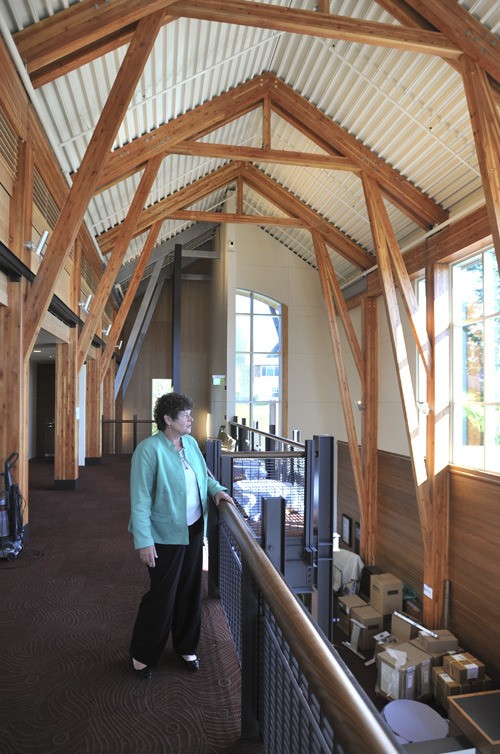The Bainbridge City Council took a large step Wednesday toward moving its Municipal Court by approving a motion to begin negotiations with the City of Poulsbo.
The 4-3 vote came following a charged two-hour session that included a standing-room-only audience and the last of more than 30 islanders who spoke against the proposed move during two meetings held over the last eight days.
The council majority (Bob Scales, Bill Knobloch, Kim Brackett and Kirsten Hytopoulos) withstood many emotional requests by community members for the court to stay put by emphasizing the safety and security improvements that the new courthouse in Poulsbo would provide.
Scales opened the session with a December 2009 tape of Judge Kathryn Carruthers imploring the council to fund a new court and police building because having court in “a glorified storage shed” at Rolling Bay was inadequate at best. He then used a power-point presentation showing the many problems involved in holding court in the current building as compared to the new, spacious courtroom the city would share with Poulsbo on a rental lease.
That was followed by a power-point presentation by Councilor Barry Peters, who has led council’s opposition to the move.
The city’s desire to reduce its budget led to conversations beginning in March about municipal collaboration between Bainbridge and Poulsbo, with the possibility of sharing a court an obvious action. A task force of mayors and councilors for both cities was formed and a report analyzing both courts was produced by staff members.
While money was the initial attraction, the report and task force focused on the need for Bainbridge to replace an unsafe and isolated facility with one that would solve the court’s security and parking problems.
“This is not a business proposition,” Scales said just before the vote was taken Wednesday. “This is about people’s lives. For the last 20 years we have been told repeatedly to get us out of the court. The court is unsafe and dangerous.”
Scales also argued that it would take 15 to 20 years before the cash-strapped city could afford to build a new court/police facility.
“It’s upsetting every time I look at that tape (of Carruthers),” he said. “Now we have an option and are in the position to give staff and the judge the facility they need. And now I’m being told that $15,000 will fix the problems (at Rolling Bay). If so, why did we spend $25,000 for a study to tell us how bad it was?”
Carruthers has reiterated her desire for the court to remain in an upgraded Rolling Bay facility because of her belief that a move to Poulsbo would be especially difficult for the court’s more vulnerable clients. Generally, she said, the court’s service to the community would suffer simply because a court should be located in the community it serves.
Negotiations for the lease arrangement likely will start at $42,500 annually. The court would pay about $31,500 per year in Rolling Bay after the building’s owner, Tord Vestman, reduced the rent by about $13,000 when the city’s interest in moving became public. Vestman said he would invest in upgrading the building’s security and air conditioning if the court stayed.
Opponents to the move focused on the possibility of Kitsap County wanting to reclaim the courtroom space it had additionally sought for its District Court and the problems caused by court visitors needing to travel 20 miles round trip Poulsbo.
Regarding the extra miles, Peters said: “To me it’s like a tax on you for using your own court. It represents 100 tons of greenhouse gas per year and to me the ultimate question is what do our citizens want?”
Island resident John Ellis said the council was a making mistake by turning its back on the community.
“You are dead wrong on this… you represent us,” he said. “This is not a money issue, but a community issue. If you go against this you are going against your constituents and community. The court is an asset and an important resource. Please keep it here.”
Some council members shared the audience’s emotions, including Hilary Franz, who voted against the move.
“It’s interesting that the dialogue up here is different than the dialogue out there,” she said. “We are the ones trying to manage risks and finances up here as if this is more of a business proposition. Not to belittle safety, but they (the community) recognized that too.”
She added that the negotiation process will be critical “because the community wants it here and need a real strong reason to move it,” she said.
Kirsten Hytopoulos, who has worked as a prosecutor, said she favors the move because of what it will mean for the safety and anonymity of victims.
“The experience of the victims is the most important thing for me,” she said. “The new court will provide safety for those who need it the most.”
Councilor Debbi Lester said she couldn’t justify the move.
“It doesn’t make sense to add more miles for our citizens,” she said. “The move will also cause another business to have hardship and hurt our local economy. And I won’t support it until we resolve the domestic violence issues.”
Scales said many issues need to be resolved during negotiations before the proposal returns to the council for another vote.


